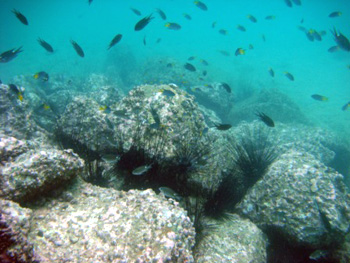
Bay County has committed to build at least 10 new artificial reefs by the end of the summer and more are in the works.
At their last meeting, county commissioners voted to accept a $60,000 grant from Florida Fish and Wildlife Conservation Commission to construct 10 new artificial reefs in an area approved by the U.S. Army Corps of Engineers about 10 nautical miles from the entrance to St. Andrew Bay at a depth of about 88 feet, according to a board memo. The reefs will augment an existing reef formed when the remnants of the old DuPont Bridge were sunk in that area.
Each reef will be composed of four premanufactured concrete and steel pods arranged in grid pattern about 600 feet apart.
“You’ll be able to bottom fish, troll and dive. There’ll be room for all of that,” Commissioner Mike Thomas said.
The grant was awarded as part of an annual, competitive process, said Bill Horn, an environmental specialist in the artificial reef program with the Division of Marine Fisheries Management. This was the first time in several years Bay County had submitted a proposal and was one of about 20 grants that received funding from about 30 applications, Horn said. This year FWC allocated about $700,000 for the construction of artificial reefs.
A large majority of the submerged land on the continental shelf is sandy and not an ideal breeding ground for popular recreational fish including red snapper, grouper and amberjack, Hunt said. The reefs provide the hard surface necessary for habitat and reproduction.
Improving recreational fishing opportunities is one of the few things that can be done to improve Bay County for tourists and locals alike, Thomas said. Fishing is an economic force in Bay County that brings in visitors, but is also a favorite pastime of locals, including Thomas himself.
“I grew up fishing and hunting and stuff here and now that the rules have changed so much it’s hard to enjoy,” he said. “It’s absolutely impossible to know what the rules are going to be. … Every person who has grown up in Bay County fishing has been disappointed.”
Varying regulations make planning long-term fishing trips difficult, so Thomas said he is committed to expanding local fishing opportunities that people can seize upon quickly, making enjoying the Gulf more convenient for everyone.
“This is too good of a place to live for people not to enjoy it year round,” he said.
Bay County is also in the permitting process for two near-shore reefs, one off of each pier about three miles from shore. The Department of Environmental Protection has approved both sites and they are currently being reviewed by the U.S. Army Corps of Engineers, which has issued a notice of intent to issue a permit, assistant county manager Dan Shaw said.
“It’s a slow process, but we’re getting over the hurdles that we need to and we’re getting there,” he said.
Bay County is also seeking money through BP for the construction of five additional sites, he said.
Source: Click Here
Content Credit: FELICIA KITZMILLER/News Herald Writer